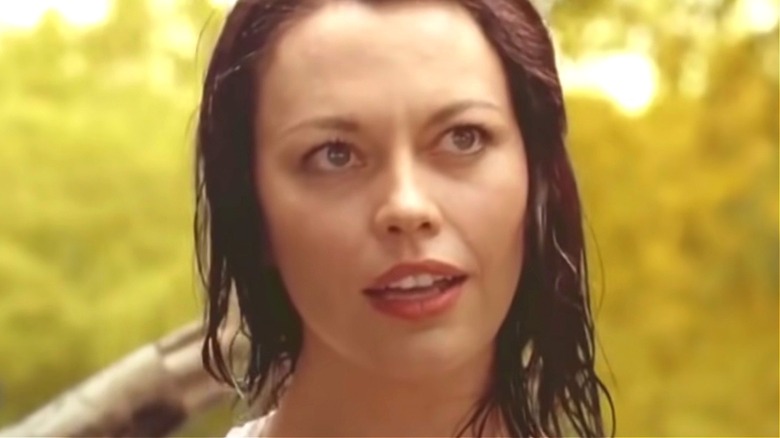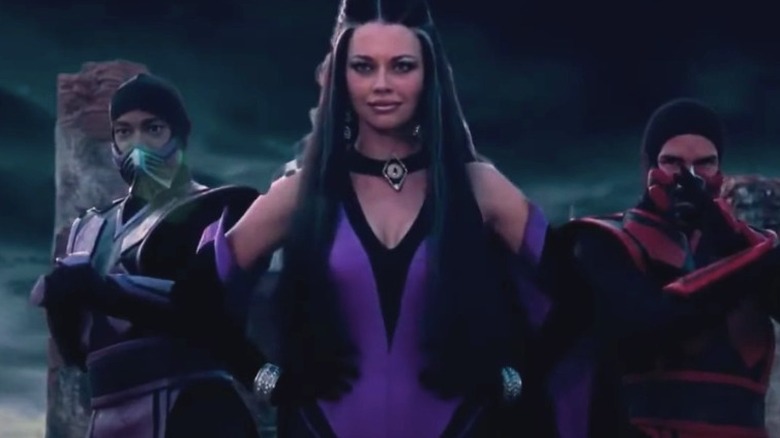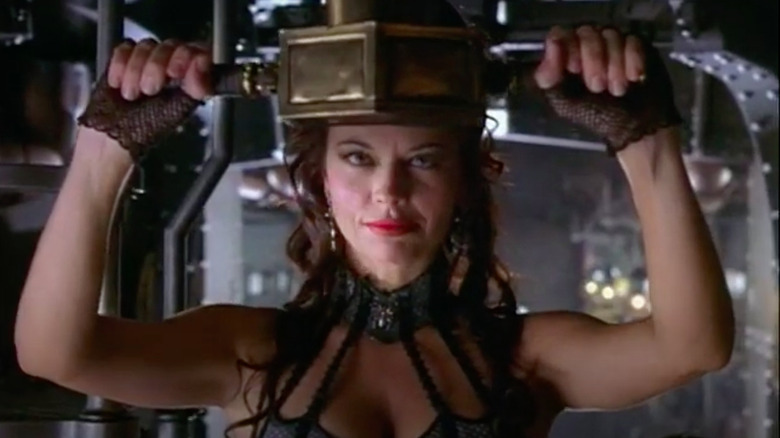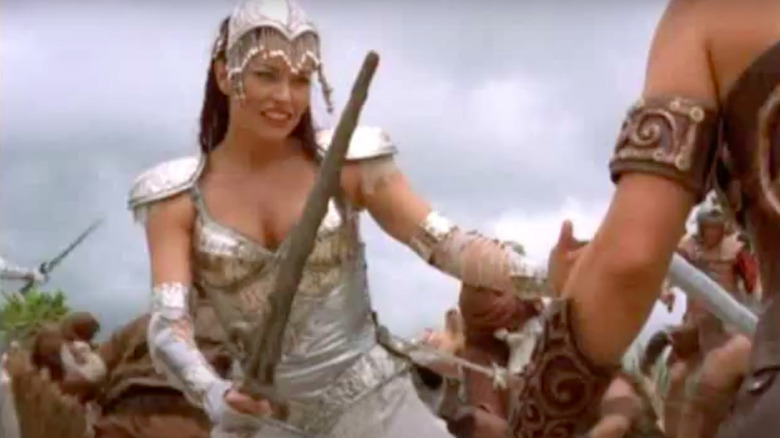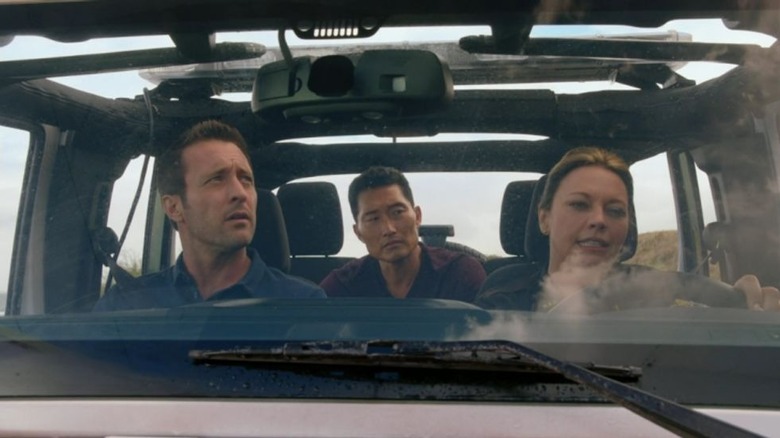Why The Siren From O Brother, Where Art Thou? Looks So Familiar
For many movie fans, there is little doubt that the Coen brothers have one of the most unique creative visions in American filmmaking. Over the course of their partnership, the duo has created classic comedies like "Raising Arizona" as well as taut thrillers such as "No Country for Old Men." However, one of their most unique films to date is "O Brother, Where Art Thou?," a comedy following three escaped convicts on the hunt for hidden treasure in the Deep South during the Great Depression. The film also appears to take ample inspiration from "The Odyssey," even including characters and ideas from Homer's original epic, including the sirens.
One siren from "O Brother, Where Art Thou?" in particular may look familiar because she is portrayed by South African actor Musetta Vander. A performer who has been working consistently since the 1980s, Vander has amassed a lengthy filmography over the course of her career, racking up over 80 acting credits. Given her long list of roles, let's take a look at some of the most noteworthy performances of her career to get a better sense of where audiences may recognize her from.
She starred in numerous music videos at the beginning of her career
While Musetta Vander would go on to become a prolific actor, she spent the early years of her career as a dancer. Arguably nothing shows that off better than the sheer number of music videos that she appeared in when she was starting out in Hollywood. This is not an uncommon phenomenon in Hollywood. Major stars such as Channing Tatum, Jennifer Lopez, and Matthew McConaughey all appeared in music videos before heading to the film world.
Vander was no different in that regard. In fact, in 1989 alone, she appeared in four different music videos, including Alice Cooper's "Bed of Nails," Rod Stewart's "This Old Heart of Mine," Elton John's "Healing Hands," and Tina Turner's "I Don't Wanna Lose You." However, Vander's work in the music video world slowly but surely slowed down in the 1990s as she shifted her focus to acting in narrative features and TV series.
She was Sindel in Mortal Kombat: Annihilation
In 1995, "Mortal Kombat" gave audiences an adaptation of the arcade game of the same name. Two years later, "Mortal Kombat: Annihilation" debuted, bringing in even more characters from the legendary fighting game series. In the movie, Musetta Vander portrays Queen Sindel, the mother of Princess Kitana (Talia Soto), who had killed herself years earlier in order to escape the rule of Shao Kahn (Brian Thompson). Though she spends much of the film under Shao Kahn's control, she eventually breaks free from him and is able to be with her daughter once again.
Although the first "Mortal Kombat" was relatively well received by fans, "Mortal Kombat: Annihilation" has become known as a notorious flop. Over the course of its box office run, the film earned only $51 million worldwide (via Box Office Mojo). Moreover, many of the film's performances have become infamous online, with Vander's take on Sindel often the butt of jokes for her overly dramatic line readings.
She played Munitia in Wild Wild West
In 1999, Will Smith reunited with "Men in Black" director Barry Sonnenfeld for "Wild Wild West," a loose adaptation of the TV series of the same name. The film saw Smith take on the role of James West, a United States Army captain on the tail of an evil genius named Dr. Arliss Loveless (Kenneth Branagh) in the years following the Civil War. In "Wild Wild West," Musetta Vander portrays Munitia, one of Loveless' henchwomen assisting him in his scheme to kidnap President Ulysses S. Grant (Kevin Kline).
Expectations were high for "Wild Wild West" when the film debuted. As the follow-up to "Men in Black" for Will Smith and Barry Sonnenfeld, many fans were hoping for them to recapture the magic of the sci-fi buddy comedy. Alas, reviews for "Wild Wild West" were largely negative, and the film failed to make an impression on mainstream audiences. As a result, "Wild Wild West" is now regarded as one of the most disappointing blockbusters of all time (via Time).
She has had short stints in several sci-fi and fantasy series
In the years following "Wild Wild West." Musetta Vander moved from sci-fi and fantasy films to sci-fi and fantasy TV series. For starters, she took on a one-episode role as the character Derran Tal in a 1999 "Star Trek: Voyager" episode titled "The Disease," which centers around the crew of the Voyager encountering a band of space-faring nomads.
After "Star Trek: Voyager," Vander squared off against one of the greatest female action heroes of that era: Lucy Lawless. Specifically, Vander portrayed Ilainus in an episode of "Xena: Warrior Princess" in 2000. Her lone appearance in the series comes during the episode "Amphipolis Under Siege," during which time she attempts to kill Xena's baby. During a climactic showdown, Xena manages to best Ilainus and defeats her in battle. From there, Vander had a short arc as Shauna in "Stargate SG-1," with one episode in 2000 and one in 2003.
She has appeared on a handful of police procedurals in recent years
In the years since Musetta Vander burst onto the scene as an actor, she has made numerous appearances in the world of television, taking on small roles in some of the most significant shows on the small screen. Perhaps most notably, she has made many appearances on some of TV's biggest police procedurals.
The first of these appearances was her role as Julie Merriweather in a 2010 episode of "NCIS" titled "Broken Arrow," which follows the murder of a former high-ranking Navy official. After this, she portrayed Miriam Nell in a 2016 "Criminal Minds: Beyond Borders" episode titled "Iqiniso," set in Johannesburg, South Africa. Lastly, Vander's most recent performance of this ilk was her turn as Sheriff Alana Smith in a 2017 "Hawaii Five-0" episode titled "Ka pa'ani nui," in which the characters hunt an alleged Nazi war criminal residing in Hawaii.
